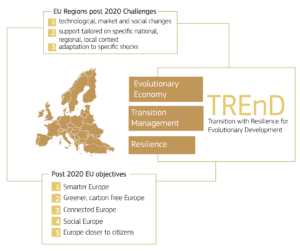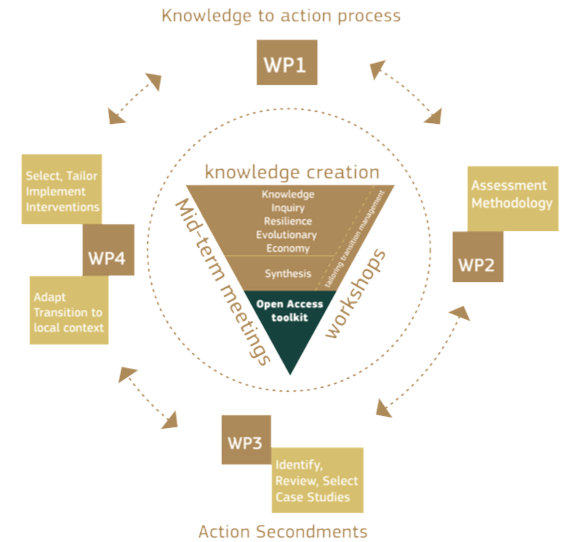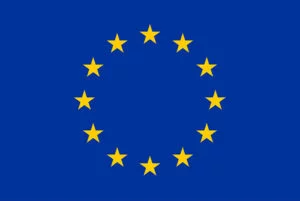TREnD Project
Transition with Resilience for Evolutionary Development
Trend is a ground-breaking project envisioning transition management and resilience-building process for the new cohesion policy 2021-2027
Transition with Resilience for Evolutionary Development
Trend is a ground-breaking project envisioning transition management and resilience-building process for the new cohesion policy 2021-2027

TREnD Is a Marie Sklodowska-Curie RISE Research Project funded by the European Union’s HORIZON 2020 Programme for Research and Innovation. The RISE Program aims to strengthen research partnerships concerning innovative issues by the exchange of researchers among EU and Non-EU countries
The Project is expected to produce a novel concept encompassing “resilience- building” processes and Transition Management strategies based on the Evolutionary Economy’s assumptions.TREnD exploits and moves forward the findings of the MAPS-LED project, consistent with the connection of knowledge based urban development (KBUD) and Entrepreneurial Discovery Process (EDP)
TREnD is finalized at strengthening the regional capabilities in triggering, implementing and managing Transition Management (TM) strategies towards driving “resilience- building” processes. The main aim is to combine Transition with Resilience for Evolutionary Development (TREnD) of different territorial contexts
The TREnD Project main objective is to stimulate the regional diversification to be seen more as a co-creation of solutions and concepts on development problems through the enhancement of the resilient capacity of regions; applying a transitional approach to tailored placed-based innovation policies.
The approach moves from the general question of how strengthening the regional capabilities in triggering, implementing and managing Transition strategies towards driving “resilience-building” processes.
The scope is to combine Transition with Resilience for Evolutionary Development in different territorial contexts towards a reforming process of Cohesion Policy for the next programming period 2021-2027.
Trend is a Marie sklodowska-Curie-RISE research project funded by the European Union’s horizon 2020 Programme
The TREnD Project calls the attention on the persistent disparities among EU regions risen despite the public investments deployed by the European Union through its policies and instruments.
Advanced regions tend to minimize their own extent of being “path-dependent”, preventing the hazardous risk to fall into “lock-in” phenomena thanks to the combined benefits generated by global dynamics and innovation concentration . A the same time, lagging regions seek to adopt the Smart Specialisation Strategies (S3) approach to reduce the gap with the most advanced regions. Within this backdrop, where the spatial development unevenness throughout Europe has been widening, the TREnD project envisions Transition Management as “coevolving processes which progressively build up toward a revolutionary change on the long term.
Specifically, the research project seeks to:
TREnD brings together: (i) Resilience as an on-going process of change rather than a recovery to a (pre-existing or new) stable equilibrium state, with (ii) Diversification as a leverage of regional resilience to absorb shocks, and (iii) Evolutionary Theory based on “continuing and progressive change”.
The innovation aspect stems from conceiving Transirio Management as a keen strategical approach to translate the combination of Resilience, Economic Diversification, and Evolutionary Theory into policy design and implementation.
The research project spreads knowledge about regional economic diversification by providing a platform in the shape of an Open Access Toolkit to policy-makers and policy-users (regional authorities, academics, stakeholders, and urban advocacy groups, etc.).
The OpenAT is expected to enhance the regional capabilities in triggering, implementing and managing Transition strategies towards resilient-building processes. It will work as a “capacity building” tool to promote the diffusion of social innovation.
The research activities are structured into 4 phases. The phases have the objective to correlate the theoretical approach stemming from the evolutionary economy with the necessity to give a practical explanation of resilience and transition in terms of indicators and metrics.

The first phase will lead to unfold critical factors, drivers and hindrances, which define Transitions and “Resilience-building” processes. Upon an evolutionary perspective, the analysis will be based on a set of indicators (socio-economical) concerning the past development trajectories (e.g. Path-dependency) and the local degree to shift into a related/unrelated diversification.


The third phase will sketch out how external shocks can provide latent opportunities to re-orient local development trajectories. The case studies will be assessed according to the “backcasting” approach in order to fully exploit the window of local opportunity disclosed in the aftermath of shocks and to design TM.
The fourth phase will be incrementally developed over project lifetime to upgrade metrics of TM and Resilience building process to be implemented through the Open Access Toolkit. The OpenAT is expected to enhance the regional capabilities in triggering, implementing and managing Transition strategies towards resilient-building processes. It will work as a “capacity building” tool to promote the diffusion of social innovation
The main goal of the research in terms of expected impact concerns the construction of the OpenAT for the European Post-2020 Cohesion Policy. The OpenAT is expected to enhance the regional capabilities in triggering, implementing and managing Transition strategies towards resilient-building processes. It will work as a “capacity building” tool to promote the diffusion of social innovation
 The OpenAT is expected to enhance the regional capabilities in triggering, implementing and managing Transition strategies towards resilient-building processes. It will work as a “capacity building” tool to promote the diffusion of social innovation. The OpenAT represents the result of the TREnD Project and will be shared with the local community, entrepreneurs, public authorities and administrations and other research institutions. Specifically, the OpenAT is aimed to provide new knowledge and services for local communities of entrepreneurs, and policymakers as well as public authorities. The OpenAT will provide a set of indicators regarding
The OpenAT is expected to enhance the regional capabilities in triggering, implementing and managing Transition strategies towards resilient-building processes. It will work as a “capacity building” tool to promote the diffusion of social innovation. The OpenAT represents the result of the TREnD Project and will be shared with the local community, entrepreneurs, public authorities and administrations and other research institutions. Specifically, the OpenAT is aimed to provide new knowledge and services for local communities of entrepreneurs, and policymakers as well as public authorities. The OpenAT will provide a set of indicators regarding
1) context,
2) results, and
3) performance as metrics of resilience-building process within TM strategies.









Bevilacqua et. al (2019). Leveraging Territorial Knowledge Dynamics for a more effective Smart Specialisation Strategies implementation by EU – lagging regions. Second Annual Conference on the Geography of Innovation and Complexity – TREnD 1st International Workshop. Utrecht, NL, 2-4 September, 2019.

Dipartimento Patrimonio Architettura Urbanistica Reggio Calabria, Italia

Dipartimento Scienze Economiche, Aziendali e Statistiche Palermo, Italia

School of Spatial Planning and Development Thessaloniki, GR

Department of Economics School of Urban Affairs Boston (MA), United States of America

Department of Economic Geography Utrecth, NL

Ruston (LA), United States of America

This Project has received funding from the European Union’s Horizon 2020 research and innovation program under the Marie Sklodowska-Curie grant agreement No 823952
